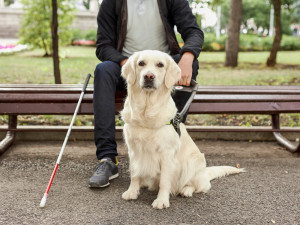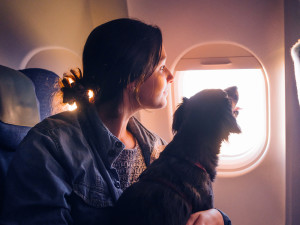A Man With a Guide Dog Was Denied Entry to a Seattle Restaurant—Now His Story Is Going Viral
The artist and influencer took to social media to document the discrimination.

share article
Last week, Paul Castleopens in a new tab, an author and illustrator who has amassed a huge following for his entertaining and informative Instagram videosopens in a new tab and TikToksopens in a new tab, took to social media to share a distressing story about an underdiscussed — and disturbingly common — form of discrimination. Castle is legally blind — he has lost ninety percent of his eyesight due to the eye disease retinitis pigmentosa — and he’s often accompanied by his guide dog, Mr. Maple. But when he recently tried to enter a restaurant in his town of Seattle, he was stopped by a waiter who insisted that there were no pets allowed, he explained in a video that instantly went viralopens in a new tab.
Castle assured the waiter that Mr. Maple was a service dog and showed the waiter Mr. Maple’s harness, which is labeled “Guide Dogs For The Blind.” The waiter responded, “You don’t look blind.”
Castle then tried to explain to the waiter that many blind people have some vision, and that Castle was able to look at the waiter but with a “pinhole of vision.” But the waiter still refused service.
“He said, ‘Do you see any other dogs in this restaurant?’ I said, ‘Honestly, no, I’m blind. There could be,’” Castle shared in his video.
Then, Castle offered to come back to the restaurant with Mr. Maple’s paperwork — which is already more than is required of anyone with a service animal under the Americans with Disabilities Actopens in a new tab (ADA). But it still wasn’t enough. The waiter threatened Castle, saying, “If you step foot back in this restaurant with that dog, I will call the police.”
It’s illegal to deny entry to a service dog
What the waiter did was completely illegal — which makes his threat to contact the police even more absurd. “According to the federal Americans with Disabilities Actopens in a new tab (ADA), staff may ask two questions: First, is the dog a service animal who is required because of a disability? Second, what work or task has the dog been trained to perform? That’s it,” Kaelynn Partlowopens in a new tab, an autistic therapist and advocate who trains service dogs, told usopens in a new tab. “They cannot ask about the person’s disability, require medical documentation, a special identification card or training documentation, or ask that the dog demonstrate the work or task.”
An establishment can only ask a person with a service dog to leave if the service dog is poorly behaved or not housebrokenopens in a new tab. There are rare instances when service animals may be excluded “if admitting service animals would fundamentally alter the nature of a service or program” — but these exceptions don’t apply to everyday restaurants. An example of an exception, according to the ADA, would be in an area of a zoo where a dog’s presence may cause specific animals to become aggressive.
The same isn’t true for Emotional Support Animals (ESAs), which aren’t necessarily allowed in public spaces. Unlike ESAs, service dogs are specially trained to perform certain tasks and are required to receive ADA accommodations.
This kind of discrimination isn’t uncommon
Unfortunately, discrimination against people with service dogs isn’t rare; Castle’s story illustrates a much larger problem. A recent study by Guide Dogs for the Blind found that 83 percent of respondents had been denied access to services (in this case, rideshare services) because of their service animals. The denials led to psychological impacts like stress, frustration, and demoralization.
“This is happening so frequently that people are questioning whether they should get a guide dog or not,” Chris Benninger, the CEO and president of Guide Dogs for the Blind, told KIRO 7opens in a new tab.
Castle is hoping that his story can be a learning experience for others. He decided not to share the name of the Seattle restaurant and instead returned himself to speak to the waiter and the manager. “It’s not about so much reprimanding people as educating them,” Castle told KIRO 7.

Sio Hornbuckle
Sio Hornbuckle is a writer living in New York City with their cat, Toni Collette.
Related articles
![A woman laying on a zig zag patterned blanket while curling around her brown and white dog]() opens in a new tab
opens in a new tabHow to Register an Emotional Support Animal
Confused about ESA rules? Here’s a comprehensive guide that explains everything you need to know about emotional support animals registration.
![Backlit photo of a woman seated on an airplane holding her dog in her lap while they both look out of the open window.]() opens in a new tab
opens in a new tabYou Can’t Fly With Your Your ESA, But Your PSD Is Welcome on a Plane
Find out how here, including what the heck those acronyms mean.
![Woman petting her small service dog.]() opens in a new tab
opens in a new tabWhat People Can and Can’t Ask You About Your Service Dog
The questions will come, so you should be prepared with answers.
![A brunette woman sitting in a wheelchair wearing a pink sweatshirt, black leggings, and brown Ugg boots petting an all white Shepherd mixed breed dog on a leash at the park outside]() opens in a new tab
opens in a new tabHow to Register Your Dog as a Service Dog
The short answer: No animal registration is required, but service dogs still need to be properly trained.
![A redheaded woman in a black hat and sunglasses holding her pug dog under her arm as well as two boarding passes and her passport in an airport hallway]() opens in a new tab
opens in a new tab10 Places Where Your ESA Is — and Is Not — Allowed
Not every public place allows ESAs — but there are ways to advocate for yourself and your needs when your pup or other ESA is not on the guest list.





